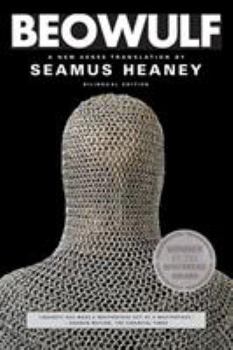Beowulf: A New Verse Translation
Select Format
Select Condition 
Book Overview
Composed toward the end of the first millennium, Beowulf is the elegiac narrative of the adventures of Beowulf, a Scandinavian hero who saves the Danes from the seemingly invincible monster Grendel and, later, from Grendel's mother. He then returns to his own country and dies in old age in a vivid fight against a dragon. The poem is about encountering the monstrous, defeating it, and then having to live on in the exhausted aftermath. In the contours...
Format:Paperback
Language:English
ISBN:0393320979
ISBN13:9780393320978
Release Date:February 2001
Publisher:W. W. Norton & Company
Length:256 Pages
Weight:0.70 lbs.
Dimensions:0.7" x 6.1" x 8.3"
Customer Reviews
4 ratings
Seamus Heany was faithful to the old english
Published by Rev. Vern Lovejoy , 2 years ago
Heaney touches on the problems of honestly translating old english in his serious Introduction, the alliteration with 4 beats per line, etc. I haven't seen any other translator of any poem make any where near as much trouble for other translators. The publisher Farrar Giroux Strauss did a beautiful job with the hardback - a gorgeous book. About the time that he began this task, I ran into Heaney in 1982 at Kitty O'Sheas waiting for someone show.
Unusual but good translation
Published by Thriftbooks.com User , 16 years ago
Frederick Rebsamen's recently revised translation of Beowulf is stands out from the crowd. Having read the poem dozens of times, both in Old English and in translation, I have to say that this is certainly the most literal rendering of the poem in modern English that I've yet read. Rebsamen states in his introduction and notes that he set out to produce a translation that would not only recreate the exciting story of the epic, but would give the reader a feel for the poetry and rhythm of the original. He has succeeded remarkably. Where most modern English editions of Beowulf are set in blank or free verse, Rebsamen follows the original four-stress pattern of Anglo-Saxon poetry and goes so far as to include the caesura or pause in the middle of each line. The language of the original also shows through very clearly. Beowulf includes scores of kennings, and Rebsamen translates many of them literally. The translation is not without flaws, of course. Owing to the lilting, stop and start rhythms typical of Old English poetry and Rebsamen's faithful translation, the phrases sometimes seem to run over one another. The unique style also takes some time to get used to, but it's certainly worth it. Recommended.
Excellent edition
Published by Thriftbooks.com User , 18 years ago
This is a beautiful translation that captures the tone and tenor of Old English. Although it eschews the alliterative line essential to Old English poetry, Heaney's rendering is magically evocative of the somber stoicism and occasionally wry understatement of this seminal poem. The critical commentary provides a nice general scholarly apparatus that helps one contextualize and better appreciate the poem and the achievement of Heaney as a modern day "scop" through whom the original - alas anonymous - poet speaks.
A terrific prose translation
Published by Thriftbooks.com User , 25 years ago
David Wright has provided the reader with an excellent prose translation of the oldest known epic of any Teutonic people and the first important poem in Old English. It deals primarily with two central events in the life of the Geatish hero Beowulf. The first is concerned with his victory over the monster Grendel who had been attacking Heorot, the mead hall of the Danish king Hrothgar (John Gardner published a novel, "Grendel", in 1971, that takes Grendel's side in the story). The next day, Beowulf slays Grendel's mother who is attempting to try and avenge her son. In the second major event, taking place fifty years later, Beowulf fights a dragon; both are mortally wounded. Hygelac, King of the Gelts, is identified with the historical Chochilaicus, who raided the lower Rhine about 512 A. D. A young Beowulf was in that raid. When Chochilaicus was killed in a battle with the Franks about 520, he was succeeded by his son Heardred. This poem shows the importance, in a warrior society, of the relationship between the warrior and his lord. The poem, even though it contains threads of Christian commentary, is also concerned with the pagen view of immortality: the memory of a warrior's heroic acts. Also: that fate can be swayed by courage. "Fate often saves an undoomed man when his courage is good."
Beowulf Mentions in Our Blog

Pause and Call Them 'Blessed'
Published by William Shelton • May 13, 2023
Motherhood is a complicated role, and every culture from the dawn of man has placed the burden of great expectations on mothers. How fitting, right, and proper it is that we pause annually to rise up and call 'blessed' those women who brought us into being through pain, tears, and toil.

Timeless Classics with Timely Updates
Published by Ashly Moore Sheldon • April 03, 2020
Getting young people to read old books can be challenging. One successful approach we’ve come across is to pair the original with a modern take on the story. Here we feature ten classic books matched with fun, updated retellings.






